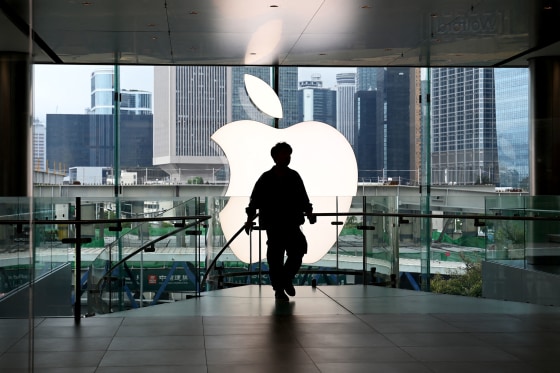HONG KONG — Apple said it has removed two popular gay dating apps from its app store in China, in compliance with an order from the country's cyberspace regulator, stoking fears within the country’s LGBTQ community.
The same-sex dating and social apps Blued and Finka suddenly became unavailable to download on iOS devices over the weekend, while users of Android devices can still download them from their official websites.
Apple said the removal was “based on an order” from the Cyberspace Administration of China but didn’t elaborate on what the order was about.
“We follow the laws in the countries where we operate,” an Apple spokesperson said in a statement to The Associated Press.
A “lite” version of the Blued app is available on Chinese app stores on both Apple and Android devices as of Tuesday, NBC News found.
BlueCity, a Beijing-based tech company that owns both Blued and Finka, didn’t announce why its apps were pulled from Apple’s app store in China. Blued has about 56 million registered users, according to OctoPlus Media, a marketing agency in Hong Kong.
BlueCity, Apple and the Chinese Cyberspace Administration did not immediately respond to NBC News' request for comment.
The removal has raised concerns among LGBTQ people in China, who have been facing a lack of legal protection and shrinking public spaces in recent years, including closures of major LGBTQ advocacy groups.
“We’re like a frog being boiled in warm water,” one user wrote Monday on RedNote, China’s Instagram-like platform. “Eventually, it will make gay people feel like secrecy is the norm.”
Gay dating apps have been “crucial” for queer men in China, a relatively conservative society, to “find community, a sense of belonging, and build relationships,” said Sam Chan, a digital cultures lecturer at the University of Sydney.
While digitally savvy gay people can turn to other online platforms, the removal of Blued and Finka has “undoubtedly taken away the most accessible and direct means of connection,” Chan told NBC News on Wednesday in an email.
The change reflects a “less tolerant stance by the state,” Chan said, noting that many queer men in China see gay dating apps as hope for “greater visibility and acceptance of the queer community someday.”
“Now, with these apps gone, that hope has been significantly diminished,” he said.
China decriminalized homosexuality in 1997 and delisted it as a mental disorder in 2001, but same-sex marriage is not legal and there is limited official recognition of gay relationships.
Homosexuality has become one of the biggest subjects of censorship in China and the target of a recent government crackdown, even though surveys show the public is increasingly supportive of LGBTQ people.
In September, the U.S. movie “Together” that featured a same-sex wedding scene was digitally altered to turn one of the two men into a woman for early screenings in mainland China.

